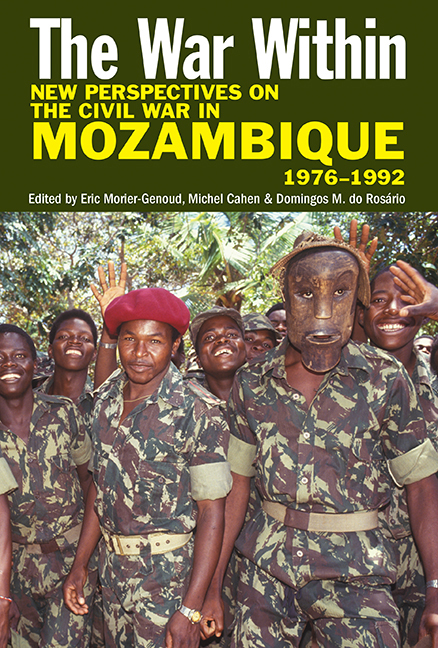Book contents
- Frontmatter
- Contents
- List of Illustrations
- Contributors
- List of Abbreviations
- Introduction The Civil War in Mozambique: A history still to be written
- Part I In the Northern Heart of the Civil War
- Part II In the South Another Kind of War?
- 5 War in Inhambane: Re-shaping state, society & economy
- 6 War Accounts from Ilha Josina Machel, Maputo Province
- Part III Inside Out: New Perspectives & The World-System
- Conclusion New Perspectives on the Civil War in Mozambique
- Towards a Bibliography of the Mozambican Civil War
- Index
5 - War in Inhambane: Re-shaping state, society & economy
from Part II - In the South Another Kind of War?
Published online by Cambridge University Press: 27 July 2018
- Frontmatter
- Contents
- List of Illustrations
- Contributors
- List of Abbreviations
- Introduction The Civil War in Mozambique: A history still to be written
- Part I In the Northern Heart of the Civil War
- Part II In the South Another Kind of War?
- 5 War in Inhambane: Re-shaping state, society & economy
- 6 War Accounts from Ilha Josina Machel, Maputo Province
- Part III Inside Out: New Perspectives & The World-System
- Conclusion New Perspectives on the Civil War in Mozambique
- Towards a Bibliography of the Mozambican Civil War
- Index
Summary
The province of Inhambane is part of the south of Mozambique that many authors have argued saw a war different from the rest of the country. The armed conflict would have been uniquely violent there, because Renamo had no legitimacy in this part of the country and the guerrilla would have had to use extra violence to compensate and manage a footing. This argument has had much success, but it is questionable. First because it is too general. Could the nature of the war have been one and the same across time and space, in all areas of southern Mozambique, in all years? Second because we should not characterize the war on the basis of the actions of a single actor (Renamo) and on the basis of only one dimension of its action (military). Last, this characterization should be questioned because it builds on a political argument made by one actor of the conflict (Frelimo) and it was articulated as soon as Renamo arrived in southern Mozambique (before much evidence could be collected). For example, in April 1982 the magazine Tempo was writing that Renamo's use of violence in Inhambane was
not just the sub-human behaviour of deformed individuals, but also a tactic of terror defined and supported by those who arm these individuals. It is in the logic of the powers who, when they cannot impose themselves through the conquest of a large social base, try to do it through the means of terror.
Anthropologist Otto Roesch tested and tried to substantiate this argument in the early 1990s through a case study of Gaza province. His argument, in general terms, was that Renamo lacked legitimacy because the guerrilla never managed to overcome its historical origins as an instrument of destabilization. Indeed, he explained, Renamo was merely a ‘product of external forces which has taken on local colour’ – a statement which is already problematic. From there, Roesch advanced three specific elements to explain Renamo's lack of legitimacy in southern Mozambique. First, communal villages had been less of a problem in the south than in the north of Mozambique. Second, traditional chiefs were weaker in southern Mozambique, hence would have provided less of a social base for Renamo to build on.
- Type
- Chapter
- Information
- The War WithinNew Perspectives on the Civil War in Mozambique 1976–1992, pp. 149 - 180Publisher: Boydell & BrewerPrint publication year: 2018
- 1
- Cited by



